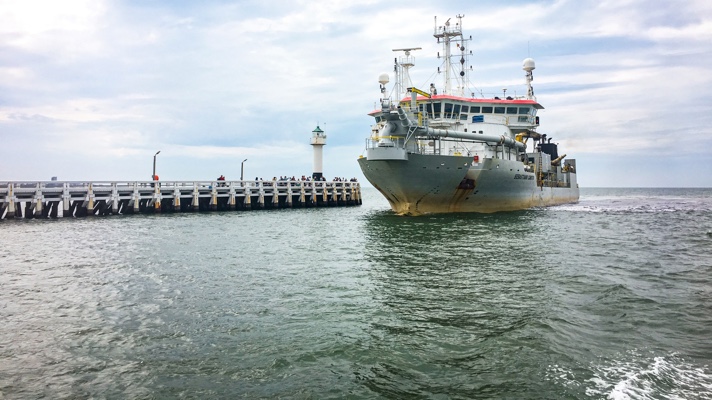Jan De Nul Group plans to reduce CO2 emissions in eighty per cent of maintenance dredging contracts in Flanders by at least fifteen per cent by 2020. The company will already achieve this reduction during maintenance dredging works at the Nieuwpoort coastal marina.
Upon issuing an invitation to tender for the maintenance dredging works in the Nieuwpoort coastal marina, the Flemish governmental Agency for Maritime and Coastal Services asked the market to focus on CO2 reduction through innovation. Jan De Nul Group won the contract by promising to reduce CO2 emissions by fifteen per cent annually. It is the first dredging company in the world to aspire to such a reduction in a commercial project.
Drop-in Biofuel
Jan De Nul Group is focusing in particular on drop-in biofuel to achieve the ambitious CO₂ reduction target. This is a high quality, sustainable replacement of fossil diesel, made of vegetable oils or waste flows. Engines do not have to be adapted in order to use it.
Additionally, not only are CO2 emissions reduced, far less fine dust is released in the air as well. Drop-in biofuel also burns a lot more efficiently than conventional diesel. Because drop-in biofuel uses waste flows as a raw material, it is also beneficial to the circular economy. Finally, it is a very clean fuel that is extremely suitable for high-grade engines.
Reducing CO2 Sector-wide
The project fits in with Jan De Nul Group’s aspiration to play a pioneering role and to roll out a sector-wide CO2 emission reduction programme. The dredging company wants to have a minimum fifteen per cent CO2 reduction requirement introduced in eighty per cent of maintenance dredging contracts in Flanders by 2022.
'We want to make the utmost effort and, in doing so, inspire other companies in our sector to focus on energy or CO2 reduction measures,' said Bart Praet, Head of Dredging Works Benelux department at Jan De Nul Group. 'We are therefore delighted to be engaged in dialogue with the Flemish government and the non-profit organization Vlaamse Waterbouwers VZW, and are working closely together with Zero Emission Solutions and the advanced sustainable fuel sector.'
CO2 Performance Ladder for Government Contracts
The announcement of the targets comes shortly after the Flemish Government’s decision to agree to a three-year pilot project for testing the CO2 performance ladder for government contracts. This ladder was developed in 2009 in the Netherlands as an instrument and certification scheme to stimulate CO2 reduction, and turned out to be very successful. The Flemish pilot project will kick off in September 2019 and last until September 2022. The expected result is that contractors will be awarded contracts if they offer maximum quality, minimal CO2 emissions and a fair price.








